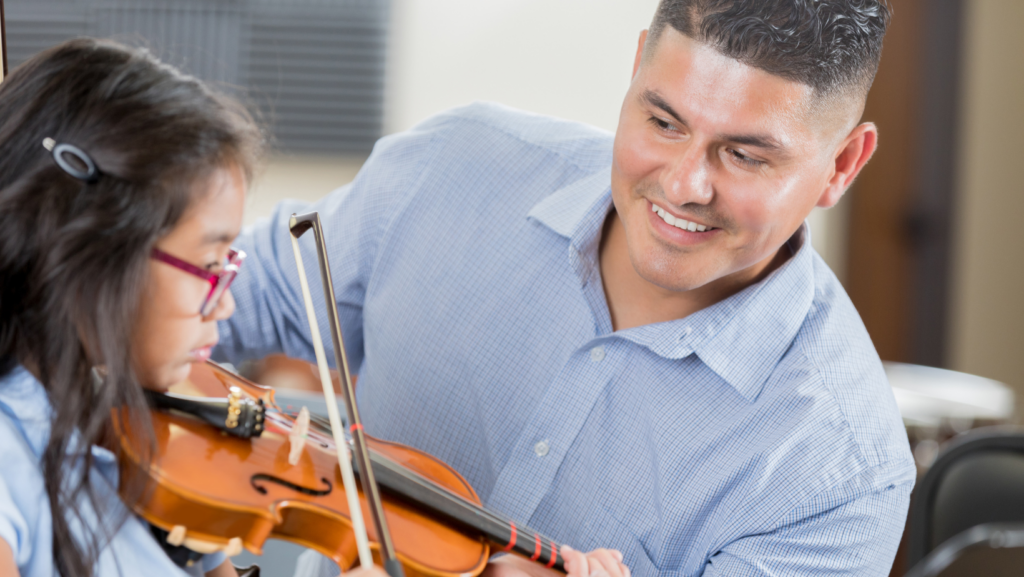In the vibrant world of music, education plays a pivotal role. It’s the bridge that connects raw talent to refined skill, nurturing the symphony of melodies that touch our souls.
Stay tuned for an insightful exploration into the career that shapes the maestros of tomorrow.
Music Education Jobs
In the sphere of entertainment, music education jobs take an essential position. They act as a bridge, mentoring budding musicians, guiding them to perfect their craft. This segment provides insights into the diverse roles within this sector and sheds light on the needed qualifications and skills for these professions.
Types of Music Education Roles
 In the world of music education, roles are as many and varied as the notes on a piece of sheet music. They comprise positions in both formal and informal settings, thus catering to a broad spectrum of learners. Here’s a rundown of some of them:
In the world of music education, roles are as many and varied as the notes on a piece of sheet music. They comprise positions in both formal and informal settings, thus catering to a broad spectrum of learners. Here’s a rundown of some of them:
- Music Teachers: They provide instruction at the primary and secondary school levels, imparting foundational knowledge of music theory, history, and practical application.
- Private Tutors: Working one-on-one, they cultivate their students’ talents, specializing in particular instruments, styles, or vocals.
- University Professors: Offering advanced courses in music, they often focus on niche areas like musicology, ethnomusicology, or music technology.
- Music Librarians: Experts in management, they maintain and organize collections of music materials.
- Music Therapists: Providing therapeutic services, they utilize music to aid in the healing process or in boosting cognitive abilities.
Job Opportunities in Schools
Music education presents numerous job opportunities in school settings, ranging from teaching positions in kindergarten through 12th grade to specialized roles in higher education institutions. An exploration of each path yields insights into job responsibilities, personal fulfillment, and the broader impact of these roles in the world of music.
K-12 Music Teaching Positions

Music education jobs in K-12 institutions offer a vast platform to nurture talent from an early age. These educators play key roles in promoting, coordinating, and executing music programs across various grade levels. Their tasks might entail instructing students in basic music theory, conducting school choirs or bands, and preparing students for musical performances.
In the K-12 world, specialized teaching opportunities also exist. For instance, a music technology teacher might focus on emerging music technology trends, while a band director may emphasize proficiency with wind, brass, and percussion instruments.
| K-12 Music Teaching Positions | Example Roles |
| General Music Teacher | Instructs students in music theory, history, and appreciation |
| Band Director | Oversees and directs school band ensembles |
| Choir Director | Directs choral ensembles |
| Music Technology Teacher | Focuses on instruction in digital music creation tools |
Such music educators exert considerable influence over their students’ musical development, instilling not just skills but also a lifelong love of music.
Higher Education Faculty Positions
 In the sphere of higher education, music faculty roles include a mix of research-oriented and practice-based positions. Professors, lecturers, and instructors in music departments guide students through rigorous academics, often specializing in distinct fields such as musicology, music theory, ethnomusicology, composition, or performance.
In the sphere of higher education, music faculty roles include a mix of research-oriented and practice-based positions. Professors, lecturers, and instructors in music departments guide students through rigorous academics, often specializing in distinct fields such as musicology, music theory, ethnomusicology, composition, or performance.
Higher education faculty also hold roles like ensemble director, leading university choirs, symphonies, or jazz bands, and music librarian, managing extensive collections of sheet music, recordings, and other musical resources.
| Higher Education Faculty Roles | Example Responsibilities |
| Music Professor | Conducts research, prepares lectures, instructs students in specialized fields |
| Ensemble Director | Carries out rehearsals and performances with university musical groups |
| Music Librarian | Manages music library resources |
In both K-12 and higher education, the impact of these roles extends beyond the classroom walls—contributing to the vibrant cycle of music learning, creation, and appreciation.
It’s clear that music education jobs offer a dynamic and rewarding career path. They’re not just about teaching music – they’re about shaping behaviors, fostering creativity, and impacting future generations. Whether you’re a music teacher in a school setting, a private tutor, or a music therapist, you’ll find immense job satisfaction and continuous learning opportunities. Plus, you’ll have the chance to express your creativity and contribute to your community.

